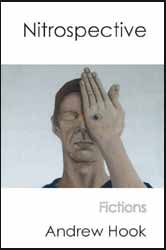|
Click here to return to the main site. Book Review
The publication of a collection of short stories from Andrew Hook is always a pleasurable occasion, partly to catch up with stories which only get better with rereading as well as discovering stories that have, as yet, only been published in periodicals. Hook not only writes but is also the award winning editor and publisher behind Elastic Press. Nitrospective (2012) collects together another twenty-one of Hooks short fiction, proving again, if proof were needed, that some of the most innovative writing is to be found in the independent press. For those who may be unaware of Hook, shame on you, he specialises in slipstream literature - those stories which do not feel the need to be constrained by genre. Slipstream is interested in good story telling with a desire to mix plots and subject matter with bacchanalian delight. The end result is often heady, but rarely dull. One of the things that I have always liked about Hook's writing is his ability to take ideas, some of which are almost public domain, and give them such a twist as to create something altogether new. The Cruekus Effect is such a story. There can be few of us unaware of the idea that every decision that we make may create a whole new parallel world, it’s been a staple of science and science fiction for some time. Stories inevitably concentrate on the protagonist going back in time to change the future. Hook takes a more domestic look at the subject. Here only one thing happens, a misspoken word changes reality, but it is the reality of an ordinary man. We follow him as he discovers that the world has shifted tracks and he has, unfortunately, come along for the ride, but it is a ride full of regret and sorrow. An idea he further explores in Outer Spaces although this story ends in a sort of muted acceptance of the situation. In direct contrast, the short story, which lends its title to the book, is a strange future tale of a torturer and his victim. He does not enjoy his work; in fact he is a hollow man finding dubious solace in his victim. Hook uses this situation to examine whether existence has meaning. Experiences are all around us to be explored, but as Hook surmises for most people “all we ever did was shop”. Hook doesn’t always have a heady philosophical axe to sharpen and is just as expert in creating moments and moods. Follow Me starts with a girl, with a very strange job, she gets followed by men for a living, but, of course, being followed inevitably leads to a little paranoia. This is also a good example of Hook’s ability to concentrate on character, through all his short stories he seems intent on fleshing out his characters. Not content only with spinning a clever idea or performing a unique sleight of hand for the reader, Hook wants you to know and empathise with the characters and does this well, within the confines of a short story. It would be a relative exercise in futility to go through each story individually; the shifts in subject matter would make this little more than a list as each story is an experience in and of itself, defining them would lose the point of slipstream literature. The full list of stories contained in the book is Nitrospective, Outer Spaces, Follow Me, The Onion Code, The Cruekus Effect, Bigger Than The Beetles, Pansy Blade Cassandra Moko, Deadtime, Ennui, Lauren Is Unreal, Photo Therapy, Red or White, Up, Shipping Tomorrow Backwards, The Glass Football, Jump, The Strangeness In Me, Love Is The Drug, Chasing Waterfalls, Caravan of Souls and Snap Shot. You can find out more about Andrew Hook through his web site, www.andrew-hook.com, which also contains some more of his short fiction. 10 Charles Packer |
|---|


